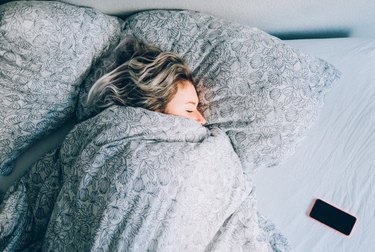According to a 2016 study by the Centers for Disease Control and Prevention's Morbidity and Mortality Week Report, more than one third of American adults are not getting as much sleep as they should be on a regular basis — and it's not doing them any favors.
The recommended amount of sleep, per the American Academy of Sleep Medicine and the Sleep Research Society, is seven or more hours per night, also deemed "a health necessity for adults" by the association.
Video of the Day
Video of the Day
How can lack of sleep or sleeping only five or less hours per night affect your health? According to University of New Mexico Pediatric Sleep Medicine Services director Dr. Madeleine Grigg-Damberger, in many ways.
"Insufficient sleep, or short sleep, can contribute to weight gain," she said. "It can change the balance of your nervous system, favoring sympathetic activity, like fear and fright."
Many Americans might be wondering — is five hours of sleep enough? And many still don't understand the mental and physical effects of not getting enough sleep. Here is how your sleeping patterns might be affecting your life.
Chronic Sleep Debt
According to the National Sleep Foundation, most people need between 7.5 and 9 hours of continuous sleep nightly — and "sleeping in" on the weekends will not counteract sleeping five or six hours a night for the rest of the week. According to Harvard Medical School, a sleep debt cause by continual deprivation is not only more difficult to recognize the more it is accumulated, but also comes with health risks that include weight gain, diabetes, heart disease and memory loss.
The body sleeps in stages that shift every 90 minutes over the course of an average eight-hour night. A sleep disorder or poor habits that block this progression create sleep debt. Feeling tired and listless follow from not getting enough sleep or experiencing poor sleep quality.
Mental Impairment
Harvard Health notes a strong connection between sleep and mental health — patients with anxiety and depression oftentimes experience sleep issues as well.
Other effects of sleep depravation include a dent in one's ability to think clearly, react quickly and form memories. These mental effects make work, study and everyday thinking activities more difficult. They can also impact interpersonal relationships.
General mental impairment plus an increased chance for clinical depression and substance abuse make sleep-deprived workers a hiring risk. A 2017 "fatigue cost calculator" developed by the Brigham Health for the National Safety Council estimated that average sized Fortune 500 companies are losing about $80 million annually do to employee fatigue.

Physical Impairment
The Better Sleep Council counts physical agility, coordination and energy as some of the victims of insufficient sleep quality. Heart functions, physical endurance and reaction time also suffer when a person doesn't get enough sleep. The National Sleep Foundation notes an increased risk for immune system and nervous system problems, obesity and diabetes in people with sleep disorders.
But perhaps the most dangerous physical effect of short sleep duration is the combination of sleepy drivers and motor vehicles. According to the National Highway Traffic Safety Administration, more than 72,000 crashes and 800 deaths in 2013 happened due to drowsy driving.
Overall, it's safe to say that only sleeping five hours a night will not make your mind or body feel good. Having difficulty falling asleep? Try these yoga poses and simple exercises that will help you get to sleep or take a page from these pro athletes' sleep books.
Is this an emergency? If you are experiencing serious medical symptoms, please see the National Library of Medicine’s list of signs you need emergency medical attention or call 911.
